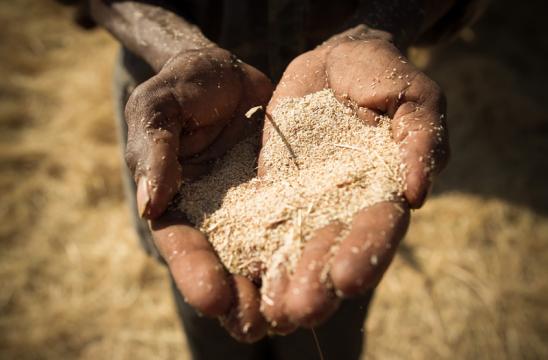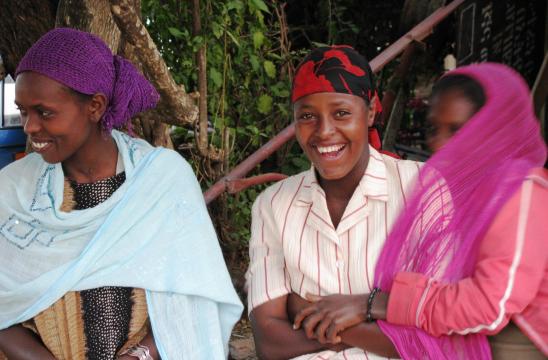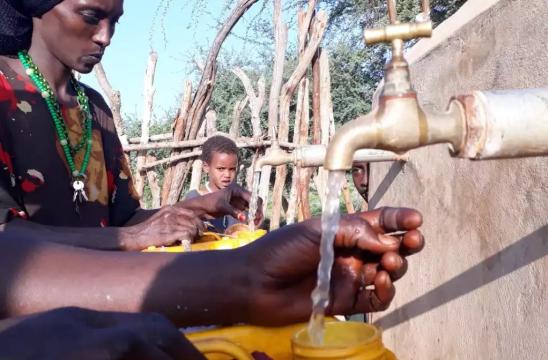The core of the LWF Ethiopia program is working with communities with an integrated development approach, emphasizing capacity building in the most remote and disadvantaged areas.
Program Overview
The LWF Ethiopia program currently implements both development and humanitarian programs across the country through 26 projects overseen by 152 staff members in 2 regional coordination offices in Ghinir in Bale Zone, Oromia Regional State and in Jijiga in Somali Regional State as well as field offices in Bambasi, Benishangul-Gumuz Regional State, in Gambella and in Lasta/Lalibela in North Wollo Zone in Amhara Regional State with the Country Office in Addis Ababa providing overall coordination and oversight. The annual budget of LWF Ethiopia is currently over EUR 5.4 million.
The core of the LWF Ethiopia program is working with communities with an integrated development approach, emphasizing capacity building in the most remote and disadvantaged areas. In the humanitarian realm, LWF is responding to recurring droughts and refugee influxes, building in components of disaster risk reduction and livelihood activities alongside the emergency provisions. The current six-year country strategy runs from 2019 to 2024 and encompasses the three main strategic program priority areas of Quality services, Livelihoods and Protection and Social Cohesion with climate and gender justice cutting across all programming.
LWF puts the woropkle it's working with, communities-at-risk, refugees and host communities and the internally displaced at the heart of its programming. LWF is committed to the core humanitarian standards that it applies across the organization for effective program management and efficient management of resources.

The Food Security and Livelihoods Projects aim to assist households to achieve sustainable food security through improved agricultural production and livelihoods, which go hand in hand with ecological management of the natural resources and community empowerment. This is achieved by promoting crop and livestock productivity through the provision of improved inputs and agricultural technologies, small scale irrigation systems and value chain, environmental conservation practices, in effect enhancing the capacity and resilience of the target population facing the effects of climate change.
Major events, such as conflicts and wars often result in displacement, loss, and separation, leading to social and psychological repercussions that can destabilize people’s capacity to manage their lives. In order to respond to the psychosocial needs, a diverse set of support is required to address the individual, family and community needs. The foundation of all community based psychosocial (CBPS) work is in the recognition of the affected community’s capacity for recovery, resilience and future rebuilding and development.
LWF Ethiopia recognizes that in order to fully meet the challenges affecting refugees’ welfare, a more comprehensive, multi-sectorial approach to refugee assistance must supersede the more traditional models of aid. One aspect of LWF’s programming which highlights the holistic nature of its services is the CBPS, designed to empower refugees through means of education, income-generating opportunities, conflict resolution, cultural events, and mobilizing refugees self-help structures. The ultimate goal of the program is to promote self-reliance and to foster positive relations among the community members, as peers.


Access to clean water contributes to poverty reduction in several ways. It enables the population to improve personal and environmental hygiene, which reduces the incidence of water-borne diseases. Healthy adults are able to do productive work and improve the well-being of their families, and they can contribute to the development of their communities. Healthy children can attend school regularly and concentrate on learning. A source of water close to the home saves time and energy of women and girls, who are responsible for fetching water. In developing nations the responsibility for collecting water every day falls disproportionately on women and girls. On average women in these regions spend 25 percent of their day collecting water for their families. This is time not spent working at an income-generating job, caring for family or attending school. Investments in water and sanitation show substantial economic gains.
LWF Ethiopia has strong roots in the rehabilitation and resilience programs with a focus on water supply; 2015 marks the 30th anniversary of the Soil and Water Conservation Programme, which was established in 1985 in response to the deteriorating drought and famine situation in the country. It became LWF’s flagship in development work, ensuring a year-round supply of water for agriculture, livestock and people, and at large, contributing to food security, environmental conservation, and self-sufficiency. The projects that focused on constructing micro-dams, hillside terracing, reforestation, irrigation systems, and feeder roads were designed as a long-term community development scheme to complement the relief aid. Between 1985-2000 LWF constructed over hundred (107 river diversion, 12 micro dams, 14 spring developments) durable and locally maintainable irrigation facilities using small rivers, springs and/or rainwater harvesting structures such as micro earth dams, river diversion and dams in different parts of the country to enable farmers to conserve the existing soil and to practice irrigated agriculture to achieve food security at the household level.


